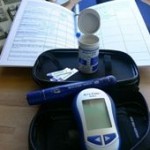How poor maternal diet can increase risk of Diabetes
Researchers from the University of Cambridge and the Medical Research Council (MRC) Toxicology Unit at the University of Leicester have shown one way in which poor nutrition in the womb can put a person at greater risk of developing type 2 diabetes and other age-related diseases in later life.
Professor Anne Willis of the MRC Toxicology Unit at the University of Leicester explains "One of the ways that our bodies cope with a rich modern western diet is by storing excess calories in fat cells. When these cells aren't able to absorb the excess then fats get deposited in other places, like the liver, where they are much more dangerous and can lead to type 2 diabetes."
The team found that this process is controlled by a molecule called miR-483-3p. They found that miR-483-3p was produced at higher levels in individuals who had experienced a poor diet in their mother's wombs than those who were better nourished.
Dr Susan Ozanne and Professor Willis and their team found that miR-483-3p works by suppressing a protein called GDF3. When they studied a group of adult humans who were born with a low birth weight, they found that GDF3 protein was present at around thirty percent more than in people born at a normal weight.
This finding could lead to new ways of identifying people who are at a higher risk of developing these diseases and might open up targets for treatment.
Their findings were published today (Friday 6 January) in the journal Cell Death and Differentiation.
